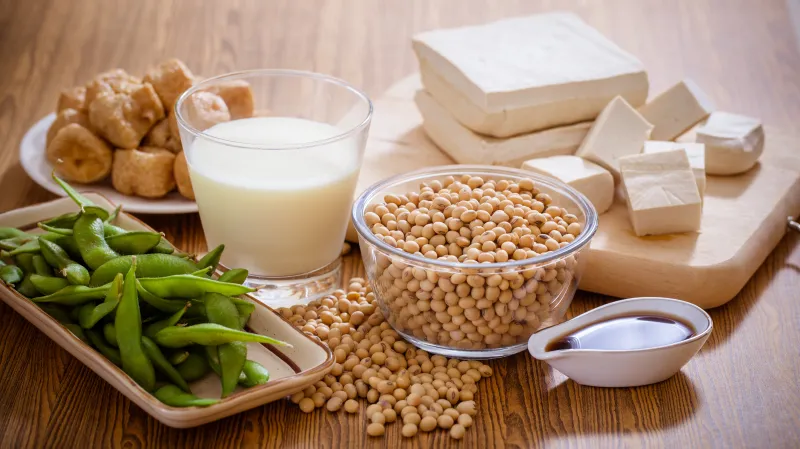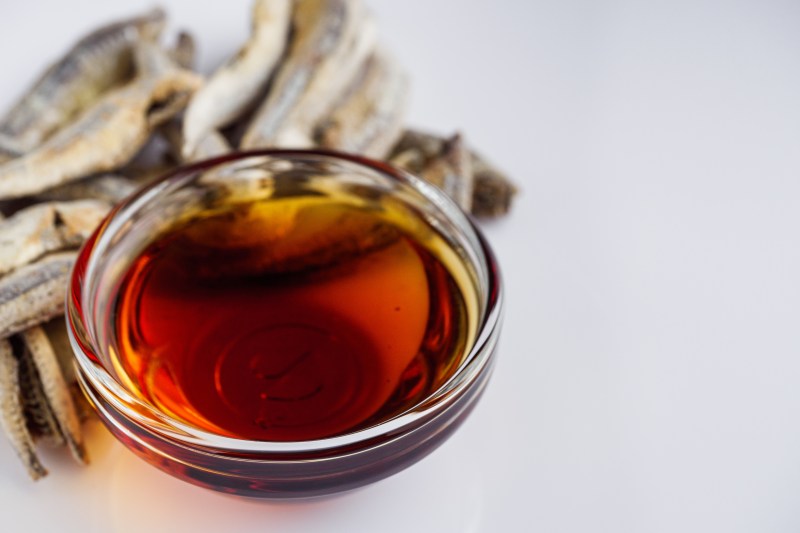At a glance
Soy sauce is low in carbohydrates, but it isn’t recommended on a Healthy Keto® plan. Most soy sauces contain ingredients that may interfere with metabolic health, but there are several flavorful alternatives that align better with a clean, low-carb lifestyle.
Soy sauce is a common ingredient in Asian cuisine and is widely used in marinades, glazes, soups, sauces, and noodle dishes. But is soy sauce keto-friendly?
Yes, soy sauce is technically keto-friendly because it’s low-carb and contains minimal sugar. However, it isn’t recommended for those following a Healthy Keto® diet due to its gluten content and the potential to trigger hormonal imbalances.
Discover the downsides of soy sauce and explore the best alternatives to enjoy the umami flavor without the risk of adverse health effects.
What is soy sauce?
Soy sauce is a condiment made from fermented soybeans and wheat. It originated in China over 2,000 years ago and was later introduced to Southeast Asia, Korea, and Japan.
There are two types of traditional soy sauce: light and dark. Light soy sauce is the original version with a light brown color, thin consistency, and pleasant, salty flavor.
Dark soy sauce undergoes longer fermentation, resulting in a thicker, darker texture and bolder soy taste. Some brands will add molasses or sugar to balance savory and sweet flavors.
As the use of soy sauce spread across Asia, numerous varieties developed, culminating in dozens of options that can be broadly categorized into five main types.
These include:
- Koikuchi (dark)
- Usukuchi (light)
- Tamari (thicker sauce)
- Shiro shoyu (white or light-colored)
- Saishikomi (sweet)
Watch the video below to learn more about the myth of soy products as health foods.
Is soy sauce keto-friendly?
Regular soy sauce is generally considered keto-friendly because it’s low in carbohydrates and contains minimal amounts of sugar.
According to data from the U.S. Department of Agriculture (USDA), a typical serving size of one tablespoon of soy sauce contains:1
- 8.5 calories
- 1.3 g protein
- 0.1 g fat
- 0.8 g total carbs
- 0.1 g fiber
- 0.7 g net carbs
Many dieters following dirty keto use soy sauce as a low-carb dipping sauce or condiment for soups and Asian-inspired keto dishes.
However, the soy sauce carbs can differ, as some varieties may include added sugar, molasses, or other ingredients that can elevate the carbohydrate count significantly.
Sweet soy sauce and certain types of dark soy sauces can have as much as five grams of net carbs per tablespoon, making them poor choices for a low-carb diet.
Additionally, low-sodium soy sauce is typically higher in carbs than regular soy sauce, with an average of two grams of net carbs per tablespoon.
Despite soy sauce being acceptable on dirty or lazy keto, soy sauce contains gluten, which isn’t suitable for a Healthy Keto diet.

Why you should rethink soy
While soy products such as soy protein, soy milk, soy sauce, and miso are widely regarded as health foods, they have many downsides that are often overlooked.
Soy allergy is among the eight most common food allergies, along with milk, eggs, shellfish, and nuts. Symptoms of soy allergies include hives, eczema, facial and throat swelling, and abdominal pain.
Additionally, soy products are predominantly made with GMO soybeans. According to data from the U.S. Food and Drug Administration (FDA), 94 percent of soybean crops planted in the United States are GMO.2
GMO crops are bioengineered to withstand heavy treatment with glyphosate, a chemical herbicide linked to cancer, reproductive harm, and gastrointestinal issues.
Soy products are also high in phytoestrogens, a group of plant-derived compounds that mimic the effects of estrogen in the body. Phytoestrogens can disrupt hormonal balance, interfere with menstrual cycles in women, and may cause reduced sperm count in men.
A study published in Internal Medicine found that excessive soy intake and associated hormonal impacts increase the risk of erectile dysfunction and gynecomastia, or enlarged breasts, in men.3

Fermented vs. unfermented soy
In addition to allergy potential, glyphosate exposure, and phytoestrogen content, unfermented soy products can block the absorption of nutrients.
Fermented soy sauce and soy foods, such as tempeh, natto, and miso, are easier to digest than unfermented products, including soy protein isolates and soy powder.
This is likely due to the presence of beneficial microbes in fermented soy foods, which help break down nutrient blockers such as phytates.
While some soy sauces are traditionally fermented, the majority available on the market are produced through a chemical process known as acid hydrolysis, which leaves anti-nutrient compounds in soy intact.
“Unfermented soy products have enzyme inhibitors that can interfere with the absorption of proteins,” explains Dr. Berg. “They also contain phytic acid, which blocks the absorption of minerals such as calcium, magnesium, iron, and zinc, potentially contributing to deficiencies..”
Mineral deficiencies can lead to fatigue, muscle weakness, slow wound healing, decreased immunity, and depression, among other physical and psychological side effects.

Soy sauce alternatives
For those adhering to a gluten-free and nutritious ketogenic lifestyle, various substitutes can be used in place of traditional soy sauce.
Here are four keto-approved soy sauce alternatives.
1. Liquid coconut aminos
Coconut aminos are one of the most popular keto-friendly soy sauce alternatives that offers a similar taste, color, and texture as soy sauce.
Liquid coconut aminos are derived from the fermented sap of coconut flowers, resulting in a savory, slightly sweet taste which adds a delightful umami flavor to various keto recipes.
Be sure to carefully read the packaging, as liquid coconut aminos and liquid aminos, derived from unfermented soybeans, are distinct products.

2. Fish sauce
Fish sauce is an East Asian seasoning made by fermenting fish in water and salt.
Though it has a noticeable fishy smell, fish sauce isn’t overbearing when used in small amounts. It’s a salty, savory flavor enhancer perfect for marinating seafood and meat, as well as seasoning salad dressings, broths, and stir-fries.
3. Dried mushrooms
Dried mushroom seasoning or mushroom broth are excellent substitutes for soy sauce as they bring a similar umami flavor, which translates to a pleasant savory taste and is often described as brothy or meaty.
Key takeaways
- Soy sauce is low in carbs, but it isn’t a good fit for a Healthy Keto® plan due to its ingredients.
- Most soy sauce contains gluten, genetically modified soy, and additives that can disrupt metabolic balance.
- Unfermented soy may hinder nutrient absorption and influence hormone activity.
- Better options include coconut aminos, fish sauce, or mushroom-based seasonings for a clean umami flavor.
FAQ
1. Is soy sauce keto-friendly?
Yes, soy sauce is considered keto-friendly because it’s low in carbohydrates. However, it’s not recommended for those on a Healthy Keto® diet, as soy sauce contains gluten, which can inflame the gastrointestinal tract.
In addition, soybeans are typically harvested from GMO crops, can have estrogenic effects on men, and may exacerbate hormonal imbalances in women.
2. Is soy sauce gluten-free?
No, soy sauce isn’t gluten-free. Soy sauce is made from fermented soy and wheat and shouldn’t be consumed by those with gluten sensitivities, celiac disease, or wheat allergies.
3. Is soy sauce low-carb?
Yes, soy sauce is low-carb. A typical serving of one tablespoon contains approximately 0.7 g of net carbs.
4. Is soy sauce high in sugar?
No, traditional soy sauce isn’t high in sugar. However, many brands add molasses or cane sugar to enhance the flavor and balance its saltiness.
5. What is a keto substitute for soy sauce?
Liquid coconut aminos, fish sauce, and dried mushrooms are good alternatives to soy sauce. These substitutes offer umami flavors but are soy and wheat-free and low in carbohydrates, making them suitable for a nutritious low-carb diet such as Healthy Keto.
Sources
- https://fdc.nal.usda.gov/fdc-app.html#/food-details/174277/nutrients ?
- https://www.fda.gov/food/agricultural-biotechnology/gmo-crops-animal-food-and-beyond ?
- https://www.ncbi.nlm.nih.gov/pmc/articles/PMC9593161/ ?


















